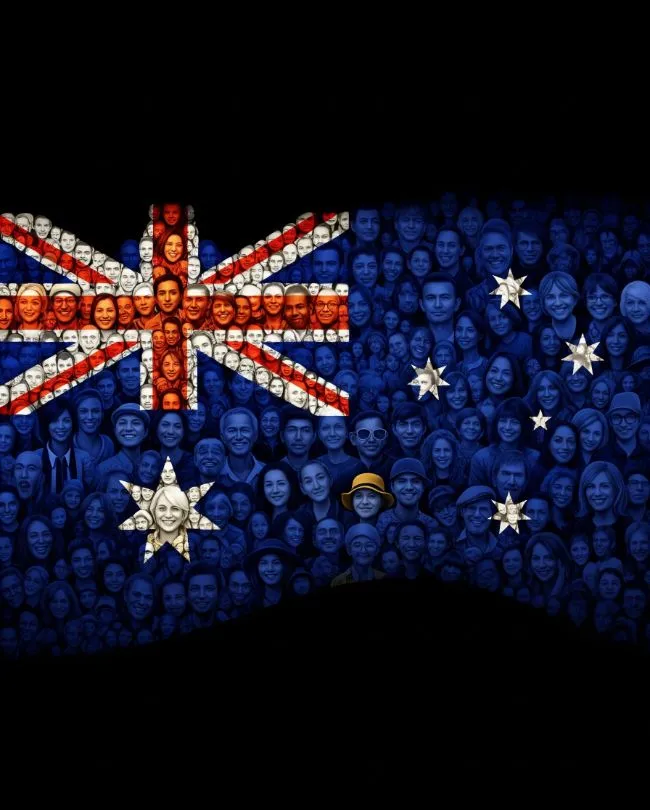Australia is more than just a destination.
It’s a way of life — one built on opportunity, community, and a steadfast commitment to fairness and progress.
At GRIA, we believe that understanding the full landscape before you take the leap is the first step towards thriving here. Here’s what you can expect when you begin your journey.

Cultural Diversity and Language
Australia stands proudly among the world’s most successful multicultural societies.
- 27.6% of residents were born overseas.
- 22.3% of households speak a language other than English at home — with Mandarin, Arabic, Vietnamese, Cantonese, and Punjabi leading the way .
Yet English remains the common thread, spoken exclusively at home by 72% of the population .
For newcomers, this bilingual spirit creates a welcoming environment: cultural identity is celebrated, and English proficiency opens pathways to career, education, and social integration.
States, Territories, and Cities
Australia is a federation comprising six states and two territories, each offering a distinct lifestyle, economy, and cultural flavour:
| State/Territory | Population (Sep 2024) | Key City | Notable Feature |
|---|---|---|---|
| New South Wales (NSW) | 8.51 million | Sydney | Finance, beaches, global business hub |
| Victoria (VIC) | 7.01 million | Melbourne | Arts, innovation, education |
| Queensland (QLD) | 5.61 million | Brisbane | Sunshine, tourism, mining |
| Western Australia (WA) | 2.98 million | Perth | Resources, remote beauty |
| South Australia (SA) | 1.88 million | Adelaide | Festivals, affordable living |
| Tasmania (TAS) | 576,000 | Hobart | Nature, heritage, food culture |
| Northern Territory (NT) | 256,000 | Darwin | Indigenous culture, tropical lifestyle |
| Australian Capital Territory (ACT) | 476,000 | Canberra | Politics, public service, research |
Australia’s largest cities — Sydney, Melbourne, Brisbane, and Perth — anchor the national economy and attract the majority of new migrants
Ethnic and Cultural Identity
Australia’s population is a vibrant tapestry:
- English ancestry (33.0%)
- Australian identity (29.9%)
- Irish (9.5%), Scottish (8.6%), Chinese (5.5%)
- Aboriginal and Torres Strait Islander peoples comprise 3.2% of the population, maintaining a rich and resilient cultural heritage .
Multicultural festivals, cuisine, and communities are embedded into daily life across the country — making it easy to find a “home away from home” while building new traditions.
Climate and Environment
Australia’s climate zones are as diverse as its people:
- Tropical (north): Hot, humid summers and warm winters.
- Subtropical (east coast): Warm, humid summers; mild winters.
- Desert/Arid (central): Very hot, dry conditions year-round.
- Temperate (south-east and south-west): Four distinct seasons.
Outdoor living is part of the national DNA — beaches, bushwalks, barbecues, and national parks feature heavily in everyday life.
However, newcomers must also adapt to Australia’s environmental challenges, including heatwaves, bushfires, and floods .
Economy, Key Industries, and Employment
Australia’s economy is dynamic, future-focused, and among the most resilient globally. The largest employing sectors as of 2024 :
- Healthcare and Social Assistance (15.6%)
- Retail Trade (9.3%)
- Construction (7.9%)
- Professional, Scientific, and Technical Services (7.9%)
- Education and Training (8.2%)
Opportunities exist across a range of skilled industries, including:
- Healthcare (aged care, nursing, allied health)
- Engineering and Construction (urban growth, infrastructure)
- Technology and Innovation (cybersecurity, software, AI)
- Education and Research
- Agriculture and Resources
Skilled migrants are in high demand, and Australia’s migration programs specifically target roles aligned to these priority industries .
Public and Private Sector Employment
Australia balances a strong private economy with a vital public sector:
- Private Sector: ~82.7% of employment — driving innovation, entrepreneurship, and commercial activity.
- Public Sector: ~17.3% of employment — providing stability across health, education, defence, and government services .
Public sector roles, particularly in health and education, offer attractive conditions for migrants with recognised qualifications.
Democracy, Governance, and Political Stability
Australia is ranked as a Full Democracy — 11th in the world — with a score of 8.85/10 in 2024
The country enjoys very high political stability, scoring 0.92 on the World Bank Political Stability Index .
What this means for you:
- Strong protections for human rights and freedoms.
- Transparent laws and reliable legal recourse.
- Stability for long-term career, education, and business planning.
Healthcare and Medicare
Healthcare is a universal right in Australia.
- Medicare covers most medical services, hospital treatment, and pharmaceuticals at subsidised or no cost .
- Private Health Insurance is optional but recommended for faster elective procedures or broader treatment options.
If you’re a permanent resident or eligible visa holder, enrolling in Medicare early should be a priority.
Education and Learning Opportunities
Australia invests heavily in education:
- Public schools are free or low-cost for permanent residents.
- Higher Education: Many permanent residents qualify for Commonwealth Supported Places (CSPs), significantly reducing university fees .
- Vocational Education and Training (VET): Offers pathways to industry-recognised qualifications.
Australia’s universities consistently rank in the world’s Top 100, making it an ideal environment for families and lifelong learners.
Practical Essentials for Settling In
- Mobile Connectivity: Grab a Telstra, Optus, or Vodafone SIM; or set up eSIM before arrival .
- Banking: Open an Australian bank account and apply for your Tax File Number (TFN) promptly.
- Driver’s Licence: Most states allow direct transfer of foreign licences within your first 3 months.
- Housing: Tight rental markets (under 2% vacancy) mean applying early and budgeting for high upfront costs .
- Public Transport: Each city offers efficient networks; smart cards like Opal (Sydney) or Myki (Melbourne) simplify travel.
Community, Lifestyle, and Work–Life Balance
Australians are known for their egalitarianism and laid-back approach:
- First names are standard even in professional settings.
- Work-life balance is protected — long hours are not admired; results are.
- Volunteering and community contribution are seen as vital to social cohesion.
If you embrace Australia’s “fair go” ethos — fairness, respect, and effort — you’ll find acceptance and opportunity in abundance.
Australia Awaits
Whether you’re seeking a safer life, better career opportunities, world-class education, or simply a fresh start — Australia offers fertile ground for growth.
At GRIAworks, we’re here to make your transition simpler, smarter, and more successful — because when your future works, Australia works.
GRIAworks for you. A better way to work, hire, and grow.


